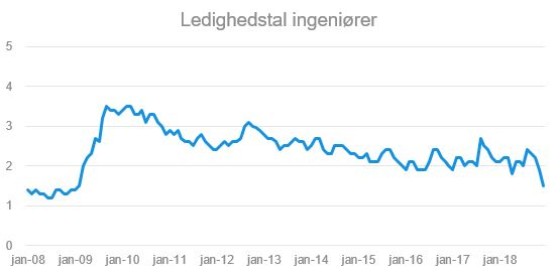News
Unemployment rate for engineers in Denmark at its lowest since the financial crisis
For the first time in more than 10 years, the unemployment rate for engineers has dropped to the same low level as before the financial crisis.
The job market for engineers is sizzling hot. The most recent employment figures from the Danish Confederation of Professional Associations’ unemployment benefit office reveal an unemployment rate of 1.5% in December 2018. Unemployment has never been this low this side of the financial crisis.
According to Juliane Marie Neiiendam, Chairman of the Council of Employees at the Danish Society of Engineers, IDA, the red warning lights are on. Because although this is a good situation for the individual engineer, it’s bad news for society.
“Although engineers can go out and demand higher wages, it’s bad news for the Danish business community."
Juliane Marie Neiiendam, Chairman, Council of Employees at IDA
“Although engineers can go out and demand higher wages, it’s bad news for the Danish business community. At worst, the shortage of labour could mean that companies have to reject orders or cancel expansion plans in Denmark. The worst-case scenario is that the shortage of highly skilled candidates with technical and scientific insight leads to outsourcing and therefore lower Danish prosperity,” she says.
The bottlenecks in the labour market for engineers have also been confirmed by new figures showing that 61% of IDA members have been headhunted or approached by head-hunters during the last 12 months.
"This is evidence that companies are being forced to poach from each other to recruit the knowledge workers they need," says Juliane Marie Neiiendam. She encourages companies to focus more on developing the skills of their own employees and to focus on newly qualified engineers when they need new knowledge workers. Even though new graduates are also finding the door to the labour market wide open, they still make up the majority of unemployed engineers.
“At a time when companies are competing for engineers, it seems paradoxical that there is a relatively large group of jobless young, job-hungry engineers with the most recent knowledge. Even though it may take some time before companies reap the full benefits of their skills, we know that the shortage of highly skilled candidates with insight into IT, technology and science will also be a reality in 3, 5 or even 10 years, and there is no prospect of companies suddenly being able to attract the perfect candidate for peanuts,” says Juliane Marie Neiiendam.
She also believes that Denmark has to become better at attracting and retaining foreign knowledge workers if we are to prevent the engineer shortage from becoming a barrier for companies.
“Highly skilled foreigners create growth and help ensure Danish welfare. Denmark has good schemes to allow Danish companies to attract knowledge and skills to Denmark on equal and fair terms. Our greatest challenge is the fact that many highly skilled candidates outside Denmark do not know that Denmark is an
attractive place to work and live. The countries around us are also challenged by a shortage of engineers, and therefore it is important that we market our labour market, our work culture and Denmark in general as an attractive place to live,” said the Juliane Marie Neiiendam.
Unemployment figures for engineers (2008-2018)
